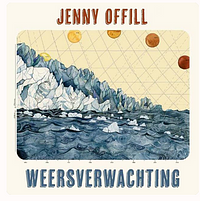Take a photo of a barcode or cover
This might be one of the most depressing and devastating books I’ve read on a long time. It’s so quiet and yet so affecting. The unnamed narrator navigates the mess of her personal and family life amid her growing awareness of climate disaster. She drops her kid off at school, tries to help her substance-addicted brother, and wonders how her marriage is holding up, all while ruminating about prepping and survival strategies and whether to move somewhere “safer” in anticipation of a dismal future. It’s depressing because of its familiarity, devastating because it’s like looking in a mirror during your late night bouts of doom and gloom.
The writing is great and the semi-stream-of-consciousness is very effective. This book would be good for those who aren’t already mired in the sort of rumination this narrator is. Lots of people need to read this book. Unfortunately I think I wasn’t one of them.
The writing is great and the semi-stream-of-consciousness is very effective. This book would be good for those who aren’t already mired in the sort of rumination this narrator is. Lots of people need to read this book. Unfortunately I think I wasn’t one of them.
Lucked into an advanced reader copy for this and it is a beautiful, lyrical novel. Offill does James Joyce proud in her defiance of plot, so as long as you let the expectation of narrative and tension, and instead give yourself over to the lyric and into a meditation on the strain and fragility of humans in the 21st century, then you won't be disappointed.
At its best, it is merely clever. And then its endless little quips become maddening; it can feel like reading the worst kind of attention-seeking Facebook posts. Eventually she tries rescuing it, and I think she fails. I had a hard time getting through this book; there’s no dimensionality to the characters, to the point where I couldn’t remember or distinguish them; and I didn’t care about the protagonist. And as much as Trump has been a disaster for the whole world, the tragedy of his election and administration is a peculiarly American one; maybe the book also didn’t succeed in making this plight relatable, even though personally I can imagine some of how it must have felt in 2016.
I remember enjoying Offill’s “Dept. of Speculation”; maybe I’ll go back to it.
I remember enjoying Offill’s “Dept. of Speculation”; maybe I’ll go back to it.
its not often that you read books set BEFORE the cataclysm. This reads like a countdown to armageddon
Really liked this, full of jokes and prepper tips, and nice that it ended before 2016 US election result. Reminded me of [b:My Year of Rest and Relaxation|44279110|My Year of Rest and Relaxation|Ottessa Moshfegh|https://i.gr-assets.com/images/S/compressed.photo.goodreads.com/books/1597676656l/44279110._SY75_.jpg|55508660]
Really liked this, full of jokes and prepper tips, and nice that it ended before 2016 US election result. Reminded me of [b:My Year of Rest and Relaxation|44279110|My Year of Rest and Relaxation|Ottessa Moshfegh|https://i.gr-assets.com/images/S/compressed.photo.goodreads.com/books/1597676656l/44279110._SY75_.jpg|55508660]
Interesting experiment in form, but ultimately dissatisfying. It has no beginning or ending as such and therefore no arc of any kind. Nothing progresses, nothing much changes, and I'm wondering why I read it to the end.
This book is written in short, sentence long vignettes that form a picture of a woman’s life. She’s a librarian, she’s worried about her brother, the end of the world, she might have an affair, she might get some dental work done. It’s enjoyable but there’s no narrative thread that keeps you reading (so arty!) and in-between reads I found myself totally forgetting what the hell was going on. All in all I found it a bit meh and am not sure what all the fuss is about.
funny
reflective
tense
medium-paced
Plot or Character Driven:
Character
Strong character development:
Complicated
Loveable characters:
Yes
Diverse cast of characters:
No
Flaws of characters a main focus:
Complicated
Read w Gretta. Ripped thru it, so good. Felt very timely and tho it was tense and sad, it was very comforting
emotional
funny
reflective
relaxing
slow-paced
Plot or Character Driven:
Character
Strong character development:
No
Loveable characters:
Yes
Diverse cast of characters:
No
Flaws of characters a main focus:
No
I started this book a bit sceptical of its aphoristic format but I soon realised to let go of the expectation of how a story is often told and embrace it for a series of thoughts and encounters which actually felt much more true to real life conversations.
Jenny Offill is witty and wise in equal measure. Her observations, quotes and questions seem to have been curated so carefully to summise how the character and many like her feel, it was such a smooth read and felt like reading messages from a friend.
I read this in 2025, I hadn’t realised it was set around the first Trump inauguration but that made it even more of an interesting social commentary.
Jenny Offill is witty and wise in equal measure. Her observations, quotes and questions seem to have been curated so carefully to summise how the character and many like her feel, it was such a smooth read and felt like reading messages from a friend.
I read this in 2025, I hadn’t realised it was set around the first Trump inauguration but that made it even more of an interesting social commentary.
reflective
sad
tense
medium-paced
Plot or Character Driven:
Character
Strong character development:
Complicated
Loveable characters:
Complicated
Diverse cast of characters:
Yes
Flaws of characters a main focus:
Yes
I liked this a lot. Had some really interesting moments, and times that made me stop and reread. Feels as relevant now (2025) as I’m sure it felt in 2020.
I love to read Jenny Offill's work. I find the flow of her words immediately arresting and intensely engaging - I open to any page and am swept along by the current.
I've recently read both [b:Dept. of Speculation|19635587|Dept. of Speculation|Jenny Offill|https://i.gr-assets.com/images/S/compressed.photo.goodreads.com/books/1420568869l/19635587._SY75_.jpg|24237023] and [b:Last Things|22856199|Last Things|Jenny Offill|https://i.gr-assets.com/images/S/compressed.photo.goodreads.com/books/1421709146l/22856199._SY75_.jpg|2455612] (in that order), and whereas it isn't entirely necessary to do so to appreciate what Offill can do with language, it definitely allowed me some perspective on her craft as I read this. That having been said, with this particular author's style and framework in mind, I viewed this one as a little bit differently.
Her hallmark, of course, is compression. To be honest, reading her work puts me more in the mind of reading poetry than it does a traditional novel. The writing is composed in un-indented, spaced blocks of text - I think of these as "stanzas" rather than paragraphs, both in presentation and in rhythm, with a uniquely emotional scansion beneath and between them.
In Weather, I felt frustrated by this technique: the personality of the protagonist extrudes from the page, as if begging you to enter into conversation with them while at the same time never allowing a chance to speak. I used to know someone like that: it was as if they were terrified to stop talking, afraid they'd never get the chance again.
In some ways, that works for the overall gestalt of the piece: it is about unpredictability, chaos, and the differences between a disaster and an emergency. The title works in a million different ways, and I grin every time I think of another way to describe the book that correlates with that beautiful title. It's about currents, the secret patterns of movements within movement, and the obsession of trying to track them, in order to get ahead of them or harness their energy.
(Fake) spoiler alert: it's not possible.
I think this is something that Offill does really well, and has done twice now, depicting the ebbs and flows of relationships (specifically those of the marital variety) and often between parent and child - and in Weather, between siblings.
Much of this novel felt like it could exist an extrapolation of Offill's other work - for me, Lizzie blurred into the protagonist from Dept. of Speculation, and both felt like possible futures for Grace, out of Last Things. This is what frustrated me the most about this book: the protagonist's thoughts didn't feel very different in tone. Dept. of Speculation worked because of its laser focus, its very regulated progression, and Last Things worked because of its wide-ranging and voracious curiosity, but Weather suffers in that Lizzie doesn't feel as developed.
Perhaps it's a casualty of the topic. Weather is something that happens to someone - it's an external force. Whether (ha! another one) for good or for ill, this phenomenon is out of our control, which robs the protagonist of much agency. Much of this story deals with the effects of things we cannot control, and how we react to disaster, yet in true Offill fashion, also deals with the converse: what is within our control. By the end of this story, it is intimated that perhaps that is a wider scope that we think.
Near to the end, the story veered into the political. There's no way this could have been avoided - to do so would have been disingenuous. Any narrative that discusses disasters and emergencies in this modern age would be remiss if it didn't concern the precarious situation we find ourselves in today.
Personally, I shy away whenever I read anything that is so contemporary that it references (even elliptically) the former president, and/or deals with the rising tide of hatred and division that has hit a high-water mark in our country. To her credit, Offill refrains from making too much commentary in that area, and uses it largely as backdrop, but there are moments where it feels a bit like the author is trying to make a point, using the narrative in a way that feels odd to me.
It's not that one can't use a story to make a point, but there's something about this story, and Offill's technique: she writes to show the naked vulnerability of the protagonist's thoughts, and in a very confessional way. It's like having access to this person's head, and their beautiful, sensitive insights. It feels like there's an implied trust between you, as a reader, and the person whose thoughts you're reading, and I guess to feel that they in any way have been yoked to a political purpose feels like I'm being manipulated.
I'm not saying that this is what Offill is intending with this story, but this hesitation on my part is what weakened my experience with this book, moreso than the others. In addition, the marital situation and drift felt very much like a retread of the same from Dept. of Speculation. Because of the format, as well as the similarity between Lizzie and the protagonist from the earlier novel, I didn't really feel that their evolution as a couple added much that was different to this narrative.
I am still dazzled by Offill's intellect, empathy, and linguistic acuity, and I will continue to read whatever she chooses to put out in the world. There is a lot that I loved in this book: the sibling relationship is by turns tender, charming, and deeply, deeply sad; the parent-child relationship is quirky and delightful, and the protagonist's relationship with her older mentor is sharply hilarious. As always, the metaphors and poetic observations are breath-taking.
I'll be curious to see how this ages, if the world doesn't evolve from the current emergency into a future disaster. If it does, and if I survive, at least I'll have learned from this how to make a candle out of a (oil-packed) can of tuna and a small piece of newspaper.
I've recently read both [b:Dept. of Speculation|19635587|Dept. of Speculation|Jenny Offill|https://i.gr-assets.com/images/S/compressed.photo.goodreads.com/books/1420568869l/19635587._SY75_.jpg|24237023] and [b:Last Things|22856199|Last Things|Jenny Offill|https://i.gr-assets.com/images/S/compressed.photo.goodreads.com/books/1421709146l/22856199._SY75_.jpg|2455612] (in that order), and whereas it isn't entirely necessary to do so to appreciate what Offill can do with language, it definitely allowed me some perspective on her craft as I read this. That having been said, with this particular author's style and framework in mind, I viewed this one as a little bit differently.
Her hallmark, of course, is compression. To be honest, reading her work puts me more in the mind of reading poetry than it does a traditional novel. The writing is composed in un-indented, spaced blocks of text - I think of these as "stanzas" rather than paragraphs, both in presentation and in rhythm, with a uniquely emotional scansion beneath and between them.
In Weather, I felt frustrated by this technique: the personality of the protagonist extrudes from the page, as if begging you to enter into conversation with them while at the same time never allowing a chance to speak. I used to know someone like that: it was as if they were terrified to stop talking, afraid they'd never get the chance again.
In some ways, that works for the overall gestalt of the piece: it is about unpredictability, chaos, and the differences between a disaster and an emergency. The title works in a million different ways, and I grin every time I think of another way to describe the book that correlates with that beautiful title. It's about currents, the secret patterns of movements within movement, and the obsession of trying to track them, in order to get ahead of them or harness their energy.
(Fake) spoiler alert: it's not possible.
I think this is something that Offill does really well, and has done twice now, depicting the ebbs and flows of relationships (specifically those of the marital variety) and often between parent and child - and in Weather, between siblings.
Much of this novel felt like it could exist an extrapolation of Offill's other work - for me, Lizzie blurred into the protagonist from Dept. of Speculation, and both felt like possible futures for Grace, out of Last Things. This is what frustrated me the most about this book: the protagonist's thoughts didn't feel very different in tone. Dept. of Speculation worked because of its laser focus, its very regulated progression, and Last Things worked because of its wide-ranging and voracious curiosity, but Weather suffers in that Lizzie doesn't feel as developed.
Perhaps it's a casualty of the topic. Weather is something that happens to someone - it's an external force. Whether (ha! another one) for good or for ill, this phenomenon is out of our control, which robs the protagonist of much agency. Much of this story deals with the effects of things we cannot control, and how we react to disaster, yet in true Offill fashion, also deals with the converse: what is within our control. By the end of this story, it is intimated that perhaps that is a wider scope that we think.
Near to the end, the story veered into the political. There's no way this could have been avoided - to do so would have been disingenuous. Any narrative that discusses disasters and emergencies in this modern age would be remiss if it didn't concern the precarious situation we find ourselves in today.
Personally, I shy away whenever I read anything that is so contemporary that it references (even elliptically) the former president, and/or deals with the rising tide of hatred and division that has hit a high-water mark in our country. To her credit, Offill refrains from making too much commentary in that area, and uses it largely as backdrop, but there are moments where it feels a bit like the author is trying to make a point, using the narrative in a way that feels odd to me.
It's not that one can't use a story to make a point, but there's something about this story, and Offill's technique: she writes to show the naked vulnerability of the protagonist's thoughts, and in a very confessional way. It's like having access to this person's head, and their beautiful, sensitive insights. It feels like there's an implied trust between you, as a reader, and the person whose thoughts you're reading, and I guess to feel that they in any way have been yoked to a political purpose feels like I'm being manipulated.
I'm not saying that this is what Offill is intending with this story, but this hesitation on my part is what weakened my experience with this book, moreso than the others. In addition, the marital situation and drift felt very much like a retread of the same from Dept. of Speculation. Because of the format, as well as the similarity between Lizzie and the protagonist from the earlier novel, I didn't really feel that their evolution as a couple added much that was different to this narrative.
I am still dazzled by Offill's intellect, empathy, and linguistic acuity, and I will continue to read whatever she chooses to put out in the world. There is a lot that I loved in this book: the sibling relationship is by turns tender, charming, and deeply, deeply sad; the parent-child relationship is quirky and delightful, and the protagonist's relationship with her older mentor is sharply hilarious. As always, the metaphors and poetic observations are breath-taking.
I'll be curious to see how this ages, if the world doesn't evolve from the current emergency into a future disaster. If it does, and if I survive, at least I'll have learned from this how to make a candle out of a (oil-packed) can of tuna and a small piece of newspaper.






